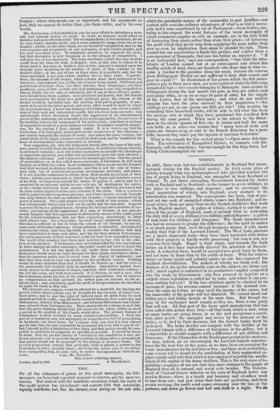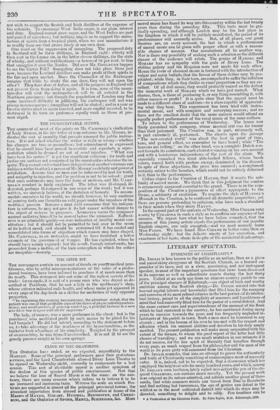WHISKY.
IN 1825, there were but two establishments in Scotland that mann ilictured whisky for the English market. In 1825 every glass of whisky (except what was metamorphosed into gin) that reached the lips of people living in England, was smuggled in from Scotland or Ireland. To • put down smuggling, Government lowered the duties both in England and in Scotland—in the former to seven shillings, in the latter to two shillings and tenpence ; and to encourage the legal importation of whisky into En land, every obstacle to its introduction was removed. The consequence has been, that at pre- sent not one cask of smuggled whisky comes into England ; and in- stead of two, there are more than twenty Scotch distilleries that work for the English market. A gallon of whisky, rectified to suit the pa- lates of the people of England, costs at present (that is, reckoning the duty Still at seven shilling-s) ten shillings and eightpence : a gallon of rum costs ten shillings and fourpence. The home manuilichirer has had no occasion to grudge the difference ; for the spirit he makes is so much purer, that, even though fonrpence dearer, it sells more readily than that of the Leeward Islands. The West India planters are a much depressed body—they have been burdened with duties until their property is hardly worth possessing: but rum is not, nor ever was their staple. Sugar is their staple, and towards the high duties on it they have repeatedly directed the attention of Govern- ment. A reduction there, would be accepted as a great boon by them, and not more by them than by the public at large. With the relative duties on home spirits and colonial spirits, no one has expressed the slightest dissatisfaction. The makers of whisky are doing well; the drinkers of it, for all the miserable cant on the subject, are doing very well' much capital is embarked in its production—capital compelled into the trade by Government : why then proceed to legislate on a subject where legislation is called for by none, and where it can pro- duce nothing but evil ? It' the love of ardent spirits be checked by an increase of price, the revenue cannot increase : it' the demand con- tinue the same as before, we may swell the income of the excise, but the immorality of the people will not diminish. We cannot mend our failing- purse and failing morals at the same time. But though the poor or the exchequer must remain as they are, there is one party that Will not. All that part of the home spirit manufactory that has been called into action since 1825—all that trade which is now, when so many trades are going down, in so fair and prosperous a condi- tion, must perish the smuggler may revive by the increase . of the duties, as he died by their decrease, but the honest trader must be destroyed. The home distiller can compete with the distiller of the Leeward Islands with a difference of fourpence in the gallon ; but it is impossible he should compete with a difference of one shilling and fourpence. If the Chancellor of the Exchequer persist in his measure, we may, indeed, go on encouraging the Leeward Islands manufac- turer-for the next four or five years, as we have been encouraging the home manufacturer for the last four or five ; and then, in all probability, some reason will be found for the annihilation of their augmented ca- pital; equally valid with that which is now employed to justify the annihi- lation of the capital of the home distillers. This is the very curse of le- gislating—a species of see-saw that does more damage to the people of England than all its natural and social evils besides. The Govern- ment of England fosters industry as the suns of England foster our garden flowers—there is a bright and beaming and cloudless week to lure them out ; and just when their hues are perfecting, and their scents evolving, the north wind comes sweeping over the face of the parterre, and down go flower and leaf and stalk in a night. We do not wish to support the Scotch and Irish distillers at the expense of the colonists. To encourage West India sugar, is our plain interest and duty. England cannot grow sugar, and the West Indies are part and parcel of ourselves ; but nothing impels us to support the manu- facture of spirits from a tropical plant, when we can manufacture it as readily from one that grows freely at our own door. One word on the suppression of smuggling. The proposed duty in Scotland will be three shillings, in England eight : whisky will then cost in the former six, in the latter eleven shillings, (in the state of whisky, and without rectification)—a bonus of 90 per cent. to him that smuggles it over the Border. Did ever Mr. GOULBURN happen to see the Carter Fell? Smuggling does not take place there just now, because the Lowland distillers can make profit of their spirits in the fair and open market. Does the Chancellor of the Exchequer imagine that while he shuts the one door, they will not open the other'? They have done it before, and all the gaugers in England will not prevent them from doine.h it again. It is true, none of the moun- tain-dew will visit the metropolis—it will be all exhaled in the Northern provinces : but though the population of London may find some increased difficulty in joll4ing, the exchequer will not wax plump in consequence ; smuggling will not be abated ; and in a year or two the duties must he again lowered, and more capital invested, to be destroyed in its tom on pretences equally weak as those at pre- Sent urged.



















 Previous page
Previous page